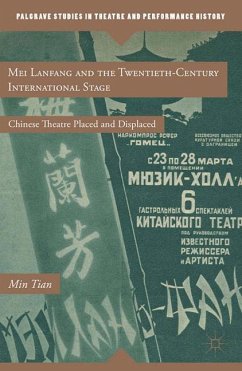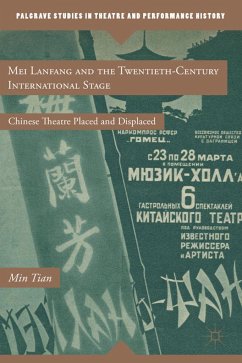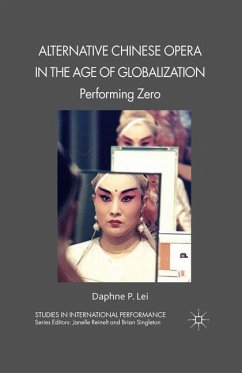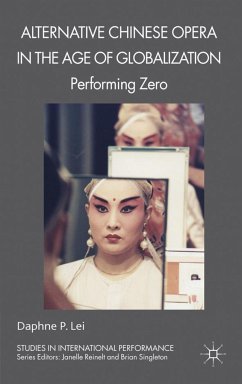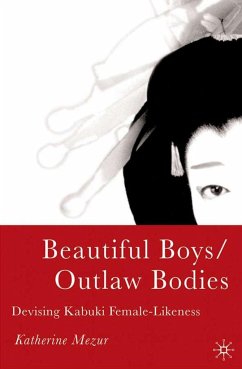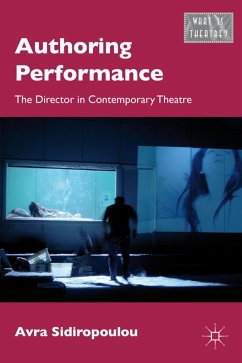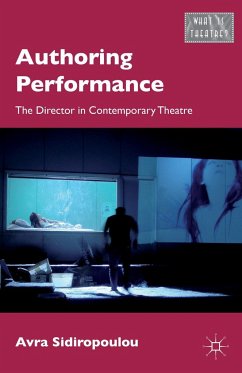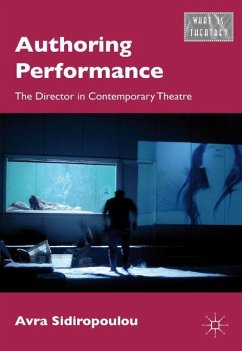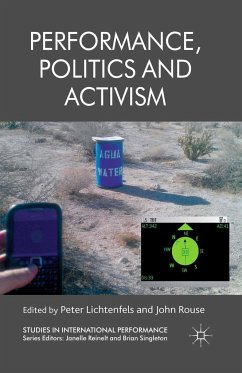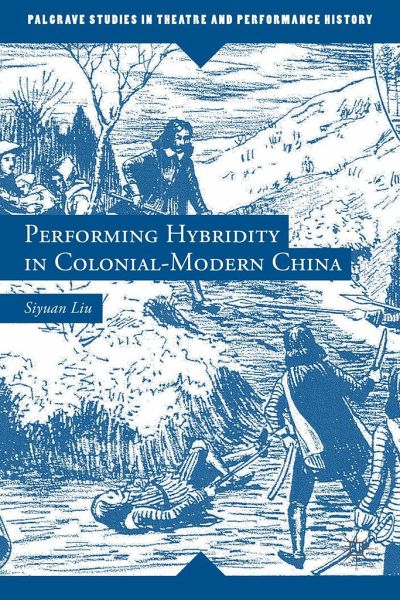
S. Liu
Gebundenes Buch
Performing Hybridity in Colonial-Modern China
Versandkostenfrei!
Versandfertig in 6-10 Tagen
Weitere Ausgaben:

PAYBACK Punkte
19 °P sammeln!





In Shanghai in the early twentieth century, a hybrid theatrical form, wenmingxi, emerged that was based on Western spoken theatre, classical Chinese theatre, and a Japanese hybrid form known as shinpa. This book places it in the context of its hybridized literary and performance elements, giving it a definitive place in modern Chinese theatre.
Siyuan Liu is an assistant professor in the Department of Theatre and Film at the University of British Columbia, Canada.
Produktdetails
- Palgrave Studies in Theatre and Performance History
- Verlag: Palgrave Macmillan / Palgrave Macmillan US / Springer Palgrave Macmillan
- Artikelnr. des Verlages: 978-1-137-30610-4
- 2013
- Seitenzahl: 245
- Erscheinungstermin: 20. März 2013
- Englisch
- Abmessung: 224mm x 137mm x 15mm
- Gewicht: 450g
- ISBN-13: 9781137306104
- ISBN-10: 1137306106
- Artikelnr.: 37264604
Herstellerkennzeichnung
Libri GmbH
Europaallee 1
36244 Bad Hersfeld
gpsr@libri.de
To come.
"Performing Hybridity in Colonial-Modern China fills a crucial gap in studies of modern Chinese theater by providing an in-depth study of the genre of wenmingxi (civilized drama) . . . [an] impeccably researched volume." - Modern Chinese Literature and Culture
"Liu's Performing Hybridity in Colonial-Modern China challenges the traditional/modern dichotomy that has dominated intercultural and postcolonial theatre studies in the past. Instead, the author adopts a model of hybridity that allows him to explore the evolving layers of influence that combined to shape the fascinating genre of wenmingxi performance in early twentieth-century China." - Bruce McConachie, Professor of Theatre Arts, University of Pittsburgh, USA
"A
"Liu's Performing Hybridity in Colonial-Modern China challenges the traditional/modern dichotomy that has dominated intercultural and postcolonial theatre studies in the past. Instead, the author adopts a model of hybridity that allows him to explore the evolving layers of influence that combined to shape the fascinating genre of wenmingxi performance in early twentieth-century China." - Bruce McConachie, Professor of Theatre Arts, University of Pittsburgh, USA
"A
Mehr anzeigen
substantial and original contribution to modern Chinese drama and performance history with historical scope and cross-cultural perspectives, this book provides insights into a wide range of issues such as self/other, nation/state, modernism, collective consciousness, and gender politics. This meticulous study breaks new ground in our understanding of Chinese performance culture in global contexts and its complex heritage. A must read for students and scholars of modern Chinese theater and its lasting impact on the formation of a 'new' nation." - Xiaomei Chen, Professor of Chinese and Comparative Literature, University of California, Davis, USA
" . . . Performing Hybridity in Colonial-Modern China is one of the few pioneering works in the field of modern Chinese theatre/performance studies. It provides a historical narrative that demonstrates the rigorous archival tenacity expected for a historian; yet it places this historical narrative within a refined theoretical framework. Visiting existing intellectual discussions and debates on the cultural politics of this concept, Liu intervenes in the discourseof hybridity with his sophisticated and insightful reading of a set of historical materials that he uses to map the contours of wenmingxi, the (literally) 'civilized drama' that, in the early twentieth century, constituted China's first, partially western-style theatre . . . Liu's scholarship challenges previous historiography by way of a modified discourse of hybridity. Unsatisfied with current discourse on intercultural theatre as well as postcolonially informed concepts of hybridity, Liu suggests his appropriation of hybridity must be 'qualified by the theoretical framework of colonial modernity developed by a group of postcolonial scholars familiar with the East Asian situation' . . . Liu's contribution to the field of modern Chinese studies lies in the sophistication of his theoretical reading of familiar materials. His grasp of Japanese materials also helps tremendously in mapping more complicated routes of cultural transmission." - Modern Drama
"Performing Hybridity in Colonial-Modern China is a field-defining attempt to reconfigure the way twentieth-century Chinese drama is historicized" megan Ammirati, Theatre Survey
" . . . Performing Hybridity in Colonial-Modern China is one of the few pioneering works in the field of modern Chinese theatre/performance studies. It provides a historical narrative that demonstrates the rigorous archival tenacity expected for a historian; yet it places this historical narrative within a refined theoretical framework. Visiting existing intellectual discussions and debates on the cultural politics of this concept, Liu intervenes in the discourseof hybridity with his sophisticated and insightful reading of a set of historical materials that he uses to map the contours of wenmingxi, the (literally) 'civilized drama' that, in the early twentieth century, constituted China's first, partially western-style theatre . . . Liu's scholarship challenges previous historiography by way of a modified discourse of hybridity. Unsatisfied with current discourse on intercultural theatre as well as postcolonially informed concepts of hybridity, Liu suggests his appropriation of hybridity must be 'qualified by the theoretical framework of colonial modernity developed by a group of postcolonial scholars familiar with the East Asian situation' . . . Liu's contribution to the field of modern Chinese studies lies in the sophistication of his theoretical reading of familiar materials. His grasp of Japanese materials also helps tremendously in mapping more complicated routes of cultural transmission." - Modern Drama
"Performing Hybridity in Colonial-Modern China is a field-defining attempt to reconfigure the way twentieth-century Chinese drama is historicized" megan Ammirati, Theatre Survey
Schließen
Für dieses Produkt wurde noch keine Bewertung abgegeben. Wir würden uns sehr freuen, wenn du die erste Bewertung schreibst!
Eine Bewertung schreiben
Eine Bewertung schreiben
Andere Kunden interessierten sich für




